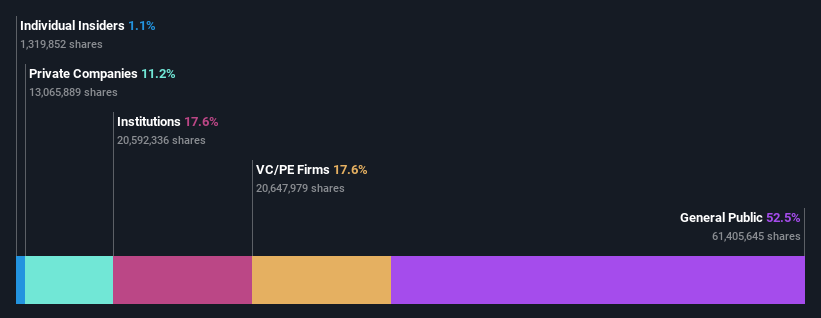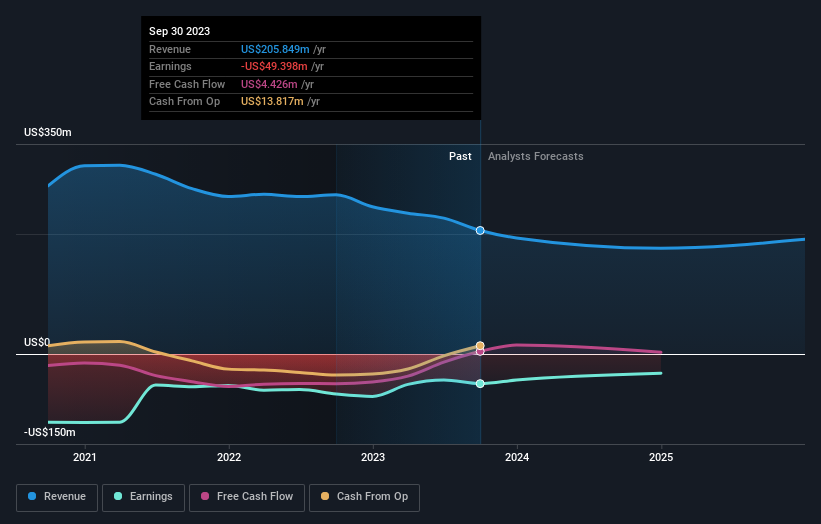- United States
- /
- Communications
- /
- NasdaqGS:INSG
Individual investors are Inseego Corp.'s (NASDAQ:INSG) biggest owners and were rewarded after market cap rose by US$205m last week

Key Insights
- Inseego's significant individual investors ownership suggests that the key decisions are influenced by shareholders from the larger public
- 46% of the business is held by the top 25 shareholders
- Institutions own 18% of Inseego
Every investor in Inseego Corp. (NASDAQ:INSG) should be aware of the most powerful shareholder groups. With 52% stake, individual investors possess the maximum shares in the company. That is, the group stands to benefit the most if the stock rises (or lose the most if there is a downturn).
As a result, individual investors were the biggest beneficiaries of last week’s 973% gain.
Let's delve deeper into each type of owner of Inseego, beginning with the chart below.
Check out our latest analysis for Inseego

What Does The Institutional Ownership Tell Us About Inseego?
Institutional investors commonly compare their own returns to the returns of a commonly followed index. So they generally do consider buying larger companies that are included in the relevant benchmark index.
As you can see, institutional investors have a fair amount of stake in Inseego. This can indicate that the company has a certain degree of credibility in the investment community. However, it is best to be wary of relying on the supposed validation that comes with institutional investors. They too, get it wrong sometimes. When multiple institutions own a stock, there's always a risk that they are in a 'crowded trade'. When such a trade goes wrong, multiple parties may compete to sell stock fast. This risk is higher in a company without a history of growth. You can see Inseego's historic earnings and revenue below, but keep in mind there's always more to the story.

Inseego is not owned by hedge funds. Looking at our data, we can see that the largest shareholder is Tavistock Life Sciences with 18% of shares outstanding. In comparison, the second and third largest shareholders hold about 11% and 4.0% of the stock.
A deeper look at our ownership data shows that the top 25 shareholders collectively hold less than half of the register, suggesting a large group of small holders where no single shareholder has a majority.
While studying institutional ownership for a company can add value to your research, it is also a good practice to research analyst recommendations to get a deeper understand of a stock's expected performance. There are a reasonable number of analysts covering the stock, so it might be useful to find out their aggregate view on the future.
Insider Ownership Of Inseego
The definition of company insiders can be subjective and does vary between jurisdictions. Our data reflects individual insiders, capturing board members at the very least. The company management answer to the board and the latter should represent the interests of shareholders. Notably, sometimes top-level managers are on the board themselves.
Most consider insider ownership a positive because it can indicate the board is well aligned with other shareholders. However, on some occasions too much power is concentrated within this group.
Our most recent data indicates that insiders own some shares in Inseego Corp.. As individuals, the insiders collectively own US$2.5m worth of the US$226m company. Some would say this shows alignment of interests between shareholders and the board. But it might be worth checking if those insiders have been selling.
General Public Ownership
The general public, mostly comprising of individual investors, collectively holds 52% of Inseego shares. This size of ownership gives investors from the general public some collective power. They can and probably do influence decisions on executive compensation, dividend policies and proposed business acquisitions.
Private Equity Ownership
Private equity firms hold a 18% stake in Inseego. This suggests they can be influential in key policy decisions. Some might like this, because private equity are sometimes activists who hold management accountable. But other times, private equity is selling out, having taking the company public.
Private Company Ownership
We can see that Private Companies own 11%, of the shares on issue. Private companies may be related parties. Sometimes insiders have an interest in a public company through a holding in a private company, rather than in their own capacity as an individual. While it's hard to draw any broad stroke conclusions, it is worth noting as an area for further research.
Next Steps:
It's always worth thinking about the different groups who own shares in a company. But to understand Inseego better, we need to consider many other factors. Like risks, for instance. Every company has them, and we've spotted 4 warning signs for Inseego (of which 2 don't sit too well with us!) you should know about.
If you are like me, you may want to think about whether this company will grow or shrink. Luckily, you can check this free report showing analyst forecasts for its future.
NB: Figures in this article are calculated using data from the last twelve months, which refer to the 12-month period ending on the last date of the month the financial statement is dated. This may not be consistent with full year annual report figures.
New: AI Stock Screener & Alerts
Our new AI Stock Screener scans the market every day to uncover opportunities.
• Dividend Powerhouses (3%+ Yield)
• Undervalued Small Caps with Insider Buying
• High growth Tech and AI Companies
Or build your own from over 50 metrics.
Have feedback on this article? Concerned about the content? Get in touch with us directly. Alternatively, email editorial-team (at) simplywallst.com.
This article by Simply Wall St is general in nature. We provide commentary based on historical data and analyst forecasts only using an unbiased methodology and our articles are not intended to be financial advice. It does not constitute a recommendation to buy or sell any stock, and does not take account of your objectives, or your financial situation. We aim to bring you long-term focused analysis driven by fundamental data. Note that our analysis may not factor in the latest price-sensitive company announcements or qualitative material. Simply Wall St has no position in any stocks mentioned.
About NasdaqGS:INSG
Inseego
Engages in the design and development of cloud-managed wireless wide area network (WAN) and intelligent edge solutions for businesses, consumers, and governments worldwide.
Undervalued moderate.


